DESKTOP
Starting a placement at any time can be daunting experience, let alone in the middle of a global pandemic. Business Management student Caoimhe Kelly kept her career goals in sight and shares her personal experience of the last year as a placement student in the Exploristics Analytics Academy.
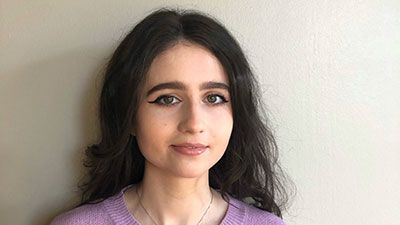
Deciding on a Placement
For my placement, I wanted to gain experience in an area of my degree that would help me decide where I would like to work in in the future. As a business management student, I decided to pursue a data analytics placement because I had enjoyed my data and statistics module on my course and wanted to learn more. I had also developed an interest in programming outside of my degree and wanted to get some hands-on training in a programming language. A career in the life sciences sector appeals to me because you can positively impact peoples’ lives and wellbeing. This made Exploristics stand out to me, as I could see the positive contribution they made to the pharmaceutical industry through their analytical work.
Placement in a Pandemic
Starting placement was a nerve-wracking experience. Due to COVID-19 my original start date 1st July was delayed until 1st September, in hope of a return to the office. Unfortunately, COVID-19 proved to be here to stay, so it was decided I would start placement remotely. After receiving a laptop and other essentials in the post and setting up an ‘at-home’ office, my first day consisted of a team’s call with my mentor and lead, Moira Murphy. She made me feel at ease from the start and I befriended fellow placement student Dearbhála early on, which made it easier to adapt to remote working.
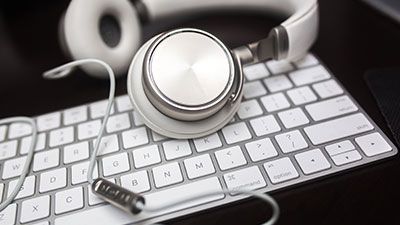
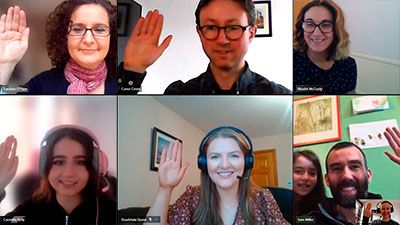
Introductions and Initial Training
My first week consisted of IT setup, reading HR documents and meeting staff. As part of the services team, it was great to connect with the others and see the type of projects they typically work on, as well as their career path up to this point.
For the next 6 weeks, I was taught SAS programming from scratch. Learning a new programming language was intimidating. However, Moira’s method of remote teaching was effective; a mixture of teams calls walking through examples and independently working on questions. Feedback was provided at all stages, allowing for a comprehensive learning experience. During this time, I was able to increase my problem-solving skills as I learned how to interpret questions and to try new ways of working out a problem. I also had to adapt my communication skills to accommodate remote work which requires constant communication.
Having a Buddy
During this time, I was partnered up with services team statistician Meabh in a buddy system, meaning we would have weekly catch-up calls to discuss how both work and non-work activities were going. This was a great idea as it added more time to socialise to the job, as remote working can often feel isolating. It was great to chat to Meabh about everything from COVID to RuPaul’s Drag Race, she made me feel very welcome. I was also able to ask her if I had any SAS questions. Being new to programming, it was a little less scary knowing that I had her expertise a call away. Meabh, together with another team member Sarah, also provided some statistics training. With them I learned how to draft a Statistical Analysis Plan (SAP), as well as some formal training on producing mock shells and following good clinical practice (GCP).
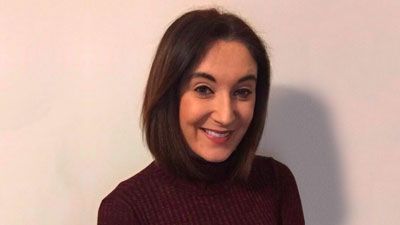
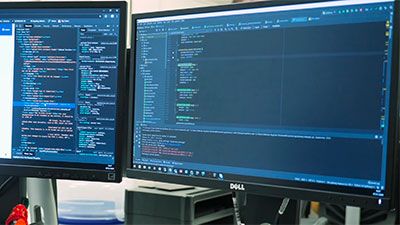
Working on Client Projects: Big Pharma
The first client project I assisted with was with a major global pharmaceutical company. I was keen to assist on their wide-reaching research survey project as it was my first experience with a real client. With support from Conor, the statistician heading the project, I complied with client requests, making updates to the formatting of questionnaires across different languages. This gave me experience with data management, honing my eye for small details and ensuring I kept the updates consistent across different languages. Although challenging, it was a rewarding project to get stuck into and hear feedback from the client in real time. The tasks helped me find my feet with client work, as well as providing new opportunities for collaboration with other members of staff.
As my experience on this project grew, I was given the role of data manager. It became my job to delegate the tasks required by team lead Moira among myself and the rest of the graduate academy. I also got the opportunity to lead on some of the tasks, such as creating the database for the questionnaires, as well as dummy data to test this database. Taking the lead was another progression for me and having the extra responsibility was a significant confidence boost. I felt incredibly motivated to set tasks up for everyone to the best of my ability. This taught me a lot about leadership and team-working, especially how to collaborate successfully and efficiently on a project.
Working on Client Projects: Small Biopharma
During my placement, I also assisted with several projects for small biopharmaceutical companies. This included working on two studies for a single company. Here, I was given a more independent role as a programmer, trusted to apply the skills learnt from my SAS programming lessons to real-life TFL (tables, figures and listing) deliverables for the client. Starting this project was another step-up for me, and it boosted my programming confidence. I worked on both the production and quality control (QC) side when programming the TFLs, working closely with my programming counterpart to assess our differences and update our codes accordingly. This enabled me to experience cooperating with a team, communicating with both statisticians and the other programmers to ensure my outputs contained all content stated in the study SAPs. It was helpful to use my programming lessons in a practical study, as I could transfer the skills that I had learnt to the project work. Working on these projects helped me to develop my time-management capabilities as we had to meet client deadlines at each stage of the studies.
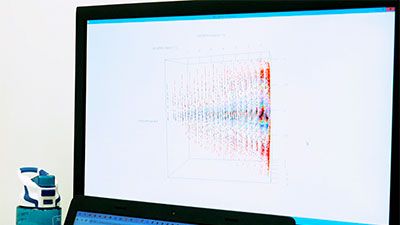
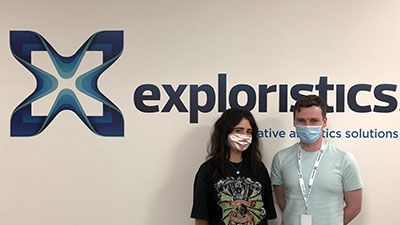
Being a Buddy
When further people joined the analytics academy over the year, I was asked to mentor Eoghan. This was a great experience as it showed my progression in the company and allowed me to connect with someone who was undergoing similar training to me. I was on hand to answer any questions he had, which solidified my knowledge and empowered me to feel more confident in what I knew. It also helped to improve my social skills as I could connect with the new graduates on LinkedIn and other social media platforms. Getting to know people who had just graduated was helpful for me as I will be graduating next year and hearing about their experiences was a valuable insight into what life is like after university.
The Exploristics Experience
I have had a wonderful and worthwhile experience during my placement. I was unsure what to expect after having such a turbulent start to the year, but I was pleasantly surprised by Exploristics. The team deserve all the credit for being such friendly, down to earth people and their approach to remote working is to be admired. As a company, they have adapted brilliantly, able to deliver high-quality teaching of complex topics using diverse methods. I now feel I fully understand the extent of the responsibilities required for the role of a data analyst and have an extensive knowledge of statistical programming. The skills I have built this year will be valuable in future, both inside and outside the workplace, and I look forward to putting them to good use. Going forward, I feel my placement has prepared me well for working life. My experience at Exploristics has helped me realise that I am passionate about this type of work. I am excited to see what the next steps are in my career and incredibly grateful for the year I have spent here.
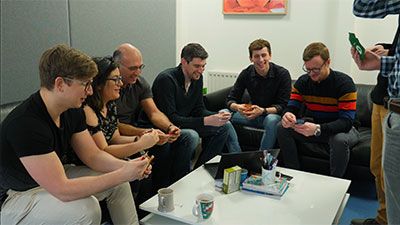
MOBILE
Starting a placement at any time can be daunting experience, let alone in the middle of a global pandemic. Business Management student Caoimhe Kelly kept her career goals in sight and shares her personal experience of the last year as a placement student in the Exploristics Analytics Academy.

Deciding on a Placement
For my placement, I wanted to gain experience in an area of my degree that would help me decide where I would like to work in in the future. As a business management student, I decided to pursue a data analytics placement because I had enjoyed my data and statistics module on my course and wanted to learn more. I had also developed an interest in programming outside of my degree and wanted to get some hands-on training in a programming language. A career in the life sciences sector appeals to me because you can positively impact peoples’ lives and wellbeing. This made Exploristics stand out to me, as I could see the positive contribution they made to the pharmaceutical industry through their analytical work.

Placement in a Pandemic
Starting placement was a nerve-wracking experience. Due to COVID-19 my original start date 1st July was delayed until 1st September, in hope of a return to the office. Unfortunately, COVID-19 proved to be here to stay, so it was decided I would start placement remotely. After receiving a laptop and other essentials in the post and setting up an ‘at-home’ office, my first day consisted of a team’s call with my mentor and lead, Moira Murphy. She made me feel at ease from the start and I befriended fellow placement student Dearbhála early on, which made it easier to adapt to remote working.

Introductions and Initial Training
My first week consisted of IT setup, reading HR documents and meeting staff. As part of the services team, it was great to connect with the others and see the type of projects they typically work on, as well as their career path up to this point.
For the next 6 weeks, I was taught SAS programming from scratch. Learning a new programming language was intimidating. However, Moira’s method of remote teaching was effective; a mixture of teams calls walking through examples and independently working on questions. Feedback was provided at all stages, allowing for a comprehensive learning experience. During this time, I was able to increase my problem-solving skills as I learned how to interpret questions and to try new ways of working out a problem. I also had to adapt my communication skills to accommodate remote work which requires constant communication.

Having a Buddy
During this time, I was partnered up with services team statistician Meabh in a buddy system, meaning we would have weekly catch-up calls to discuss how both work and non-work activities were going. This was a great idea as it added more time to socialise to the job, as remote working can often feel isolating. It was great to chat to Meabh about everything from COVID to RuPaul’s Drag Race, she made me feel very welcome. I was also able to ask her if I had any SAS questions. Being new to programming, it was a little less scary knowing that I had her expertise a call away. Meabh, together with another team member Sarah, also provided some statistics training. With them I learned how to draft a Statistical Analysis Plan (SAP), as well as some formal training on producing mock shells and following good clinical practice (GCP).

Working on Client Projects: Big Pharma
The first client project I assisted with was with a major global pharmaceutical company. I was keen to assist on their wide-reaching research survey project as it was my first experience with a real client. With support from Conor, the statistician heading the project, I complied with client requests, making updates to the formatting of questionnaires across different languages. This gave me experience with data management, honing my eye for small details and ensuring I kept the updates consistent across different languages. Although challenging, it was a rewarding project to get stuck into and hear feedback from the client in real time. The tasks helped me find my feet with client work, as well as providing new opportunities for collaboration with other members of staff.
As my experience on this project grew, I was given the role of data manager. It became my job to delegate the tasks required by team lead Moira among myself and the rest of the graduate academy. I also got the opportunity to lead on some of the tasks, such as creating the database for the questionnaires, as well as dummy data to test this database. Taking the lead was another progression for me and having the extra responsibility was a significant confidence boost. I felt incredibly motivated to set tasks up for everyone to the best of my ability. This taught me a lot about leadership and team-working, especially how to collaborate successfully and efficiently on a project.

Working on Client Projects: Small Biopharma
During my placement, I also assisted with several projects for small biopharmaceutical companies. This included working on two studies for a single company. Here, I was given a more independent role as a programmer, trusted to apply the skills learnt from my SAS programming lessons to real-life TFL (tables, figures and listing) deliverables for the client. Starting this project was another step-up for me, and it boosted my programming confidence. I worked on both the production and quality control (QC) side when programming the TFLs, working closely with my programming counterpart to assess our differences and update our codes accordingly. This enabled me to experience cooperating with a team, communicating with both statisticians and the other programmers to ensure my outputs contained all content stated in the study SAPs. It was helpful to use my programming lessons in a practical study, as I could transfer the skills that I had learnt to the project work. Working on these projects helped me to develop my time-management capabilities as we had to meet client deadlines at each stage of the studies.

Being a Buddy
When further people joined the analytics academy over the year, I was asked to mentor Eoghan. This was a great experience as it showed my progression in the company and allowed me to connect with someone who was undergoing similar training to me. I was on hand to answer any questions he had, which solidified my knowledge and empowered me to feel more confident in what I knew. It also helped to improve my social skills as I could connect with the new graduates on LinkedIn and other social media platforms. Getting to know people who had just graduated was helpful for me as I will be graduating next year and hearing about their experiences was a valuable insight into what life is like after university.

The Exploristics Experience
I have had a wonderful and worthwhile experience during my placement. I was unsure what to expect after having such a turbulent start to the year, but I was pleasantly surprised by Exploristics. The team deserve all the credit for being such friendly, down to earth people and their approach to remote working is to be admired. As a company, they have adapted brilliantly, able to deliver high-quality teaching of complex topics using diverse methods. I now feel I fully understand the extent of the responsibilities required for the role of a data analyst and have an extensive knowledge of statistical programming. The skills I have built this year will be valuable in future, both inside and outside the workplace, and I look forward to putting them to good use. Going forward, I feel my placement has prepared me well for working life. My experience at Exploristics has helped me realise that I am passionate about this type of work. I am excited to see what the next steps are in my career and incredibly grateful for the year I have spent here.




